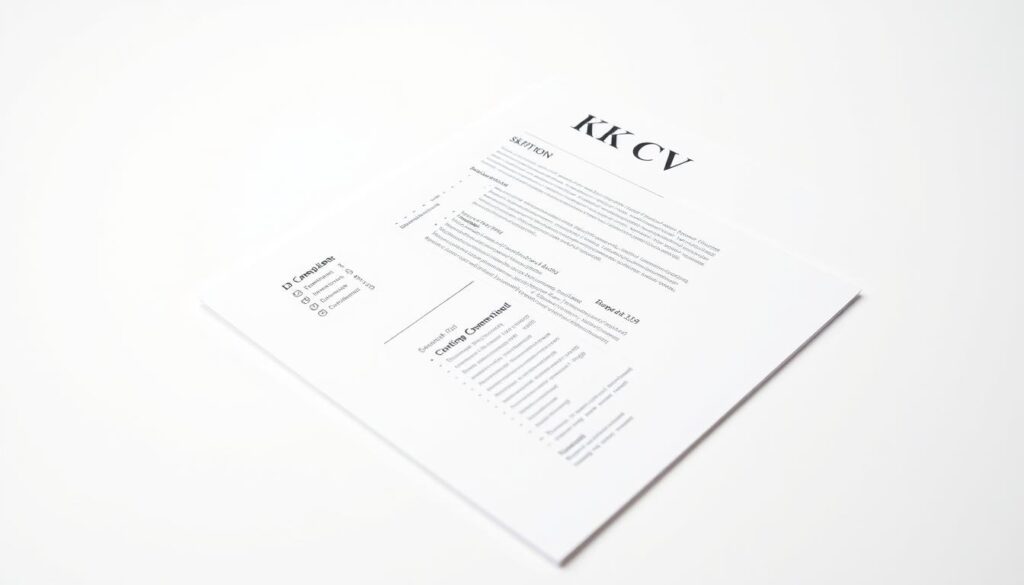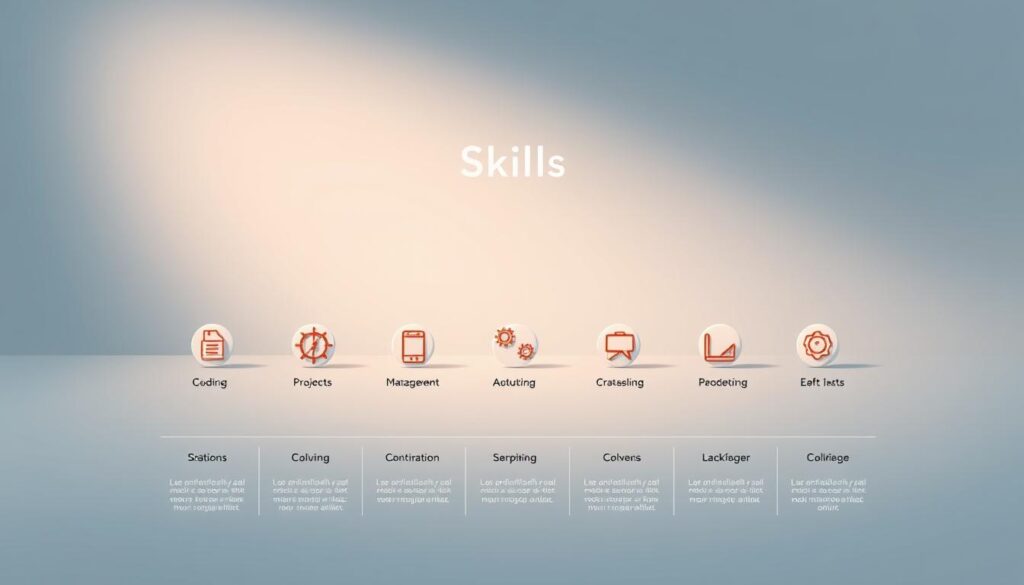CV That Gets Results: Templates That UK Employers Love

In the competitive UK job market, a well-crafted CV is crucial for securing an interview. Employers often receive numerous applications, making it essential to stand out from the crowd.
Using templates that UK employers love can significantly enhance your CV’s impact. These templates are designed to meet the expectations of hiring managers, ensuring your application is both visually appealing and effectively structured.
A CV that gets results is one that clearly communicates your skills, experience, and achievements. By leveraging proven templates, you can increase your chances of securing an interview and taking the next step in your career.
Key Takeaways
- Use CV templates tailored to the UK job market to enhance your application’s impact.
- Ensure your CV is well-structured and visually appealing to hiring managers.
- Clearly communicate your skills, experience, and achievements.
- Increase your chances of securing an interview with a well-crafted CV.
- Leverage proven CV templates to stand out in a competitive job market.
The Current State of CV Success in the UK Job Market
To succeed in the UK job market, job seekers must tailor their CVs to meet the expectations of British recruiters. The competition is fierce, and a well-crafted CV can make all the difference.
British recruiters are looking for CVs that are clear, concise, and relevant to the job description. They want to see achievements and skills that align with the requirements of the position.
What British Recruiters Look For in 2023
In 2023, British recruiters are focusing on:
- Tailored CVs that match the job description
- Clear and concise language
- Relevant skills and achievements
- A professional layout and design
By incorporating these elements, job seekers can increase their chances of getting noticed.
How the Right CV Template Increases Interview Chances
Using the right CV template can significantly enhance a job seeker’s chances of securing an interview. A well-structured template helps to:
- Highlight relevant experience and skills
- Present information in a clear and concise manner
- Create a professional impression
By choosing a template that is tailored to the UK job market, job seekers can ensure their CV meets the expectations of British recruiters.
Understanding UK CV Standards vs. International Resumes
Understanding the nuances of UK CV standards is crucial for job seekers aiming to make a strong impression on British employers. While international resumes share some similarities, there are distinct differences that can make or break a candidate’s chances.
Key Differences Between UK CVs and American Resumes
One of the primary differences lies in the length and detail of the CV. Unlike American resumes, which often include a summary or objective statement at the beginning, UK CVs typically start with contact information followed by a professional profile or summary.
- UK CVs tend to be more concise, usually no more than two pages.
- American resumes often include a career objective, which is less common in UK CVs.
Length and Format Expectations for British Employers
British employers expect CVs to be concise and to the point, with a clear and standard format. The recommended length is typically two pages, and the format should be clean and easy to read.

By understanding these differences and tailoring their CVs accordingly, job seekers can significantly improve their chances of securing an interview in the UK job market.
Selecting the Right CV Format for Your Career Stage
The CV format you select can significantly impact your chances of securing an interview. With various formats available, it’s essential to choose one that best showcases your skills and experience according to your career stage.
Chronological CV: The Traditional British Approach
A chronological CV is the most traditional format, listing your work experience in reverse chronological order. This format is ideal for those with a consistent work history and is often preferred by British employers. It highlights career progression and stability, making it suitable for individuals in established careers.
Functional CV: Highlighting Skills Over Experience
A functional CV focuses on your skills and qualifications rather than your work history. This format is beneficial for those with gaps in their employment history or those changing careers. It allows you to emphasize your relevant skills and achievements, making it a good choice for individuals looking to transition into a new field.
Combination CV: The Best of Both Worlds
A combination CV balances your work history and skills, offering a comprehensive view of your qualifications. This format is versatile and can be tailored to various career stages and industries. It is particularly useful for those who want to highlight both their achievements and their skill set.
Which Format Works Best for Your Situation
Choosing the right CV format depends on your individual circumstances. For instance, a chronological CV is suitable for those with a steady career progression, while a functional CV is better for those with employment gaps. A combination CV is ideal for those who want to showcase both their experience and skills. Consider your career stage, industry, and the job you’re applying for when making your decision.
By selecting the appropriate CV format, you can effectively communicate your value to potential employers and increase your chances of securing an interview.
CV That Gets Results: Essential Elements Every UK CV Must Include
To stand out in the competitive UK job market, a CV must include several essential elements that showcase a candidate’s skills, experience, and qualifications. A well-crafted CV is crucial for making a positive impression on potential employers and increasing the chances of securing an interview.

Contact Information and Professional Profile
The contact information section should be clear and concise, including a professional email address, phone number, and address. A professional profile or summary should be a brief overview of the candidate’s experience, skills, and achievements, tailored to the specific job application. As “Your CV is often your first opportunity to make an impression on a potential employer, so make it count.”
Work Experience and Achievements
The work experience section should highlight relevant experience and achievements, with a focus on accomplishments rather than just listing job responsibilities. Using action verbs like “managed,” “created,” and “increased” can help to describe achievements effectively. For example,
“Results-driven marketing professional with 5 years of experience in managing successful campaigns and increasing brand engagement.”
Education and Qualifications
The education section should include relevant academic qualifications, such as degrees and certifications. It’s essential to list the qualification name, institution, and date achieved. For instance, “Bachelor’s Degree in Business Administration, XYZ University, 2018.”
Skills and Competencies
The skills section should highlight relevant technical, language, and soft skills that align with the job requirements. Being specific about proficiency levels and including relevant certifications can strengthen this section. For example, “Proficient in Microsoft Office Suite, with advanced skills in Excel and PowerPoint.”
Crafting a Compelling Personal Statement That Grabs Attention
In the competitive UK job market, a compelling personal statement can be the key to standing out. This crucial section of your CV is where you can showcase your unique value to potential employers, highlighting your strengths and career goals.
Structure and Length Guidelines for UK CVs
A well-structured personal statement should be concise, typically no more than 100-150 words, and written in a professional tone. It should be structured to include a brief introduction, a summary of your key skills and experience, and a statement of your career aspirations.
What to Include and What to Avoid
When crafting your personal statement, it’s essential to include relevant keywords from the job description and highlight your achievements. Avoid clichés and generic phrases that don’t add value to your application.
Power Words That Impress UK Employers
Using power words such as “achieved,” “managed,” “created,” and “improved” can make your personal statement more dynamic. For example, “Managed a team of 10 people, achieving a 25% increase in productivity.”
Clichés That Make Recruiters Cringe
Phrases like “team player,” “results-driven,” and “thinking outside the box” are overused and may deter recruiters. Instead, focus on specific examples that demonstrate these qualities.
| Power Words | Clichés to Avoid |
|---|---|
| Achieved | Team player |
| Managed | Results-driven |
| Created | Thinking outside the box |
“A personal statement is your chance to tell the story of your career. Make it count by being clear, concise, and compelling.”
By following these guidelines and using the right language, you can create a personal statement that grabs the attention of UK employers and helps you stand out in the job market.
Showcasing Your Work Experience to Demonstrate Value
To stand out in the UK job market, it’s essential to showcase work experience in a way that demonstrates tangible value. This involves more than just listing job responsibilities; it requires highlighting achievements and the impact made in previous roles.

Highlighting Achievements Over Responsibilities
When detailing work experience, the focus should be on achievements rather than just responsibilities. For instance, instead of saying “responsible for managing a team,” a more effective approach would be to say “successfully led a team to achieve a 25% increase in productivity.” This shift in focus helps to demonstrate the value a candidate can bring to a potential employer.
Achievements are the backbone of a strong CV, providing evidence of a candidate’s capabilities and the impact they can have in an organization.
Quantifying Your Impact with Numbers and Metrics
Quantifying achievements by using numbers and metrics adds credibility and clarity. For example, stating that you “increased sales by 15% within 6 months” or “reduced operational costs by 20% through process improvements” gives a clear picture of your capabilities. Using metrics helps employers understand the scale and significance of your achievements.
“The key to a successful CV is not just listing your job responsibilities, but quantifying your achievements to demonstrate your impact.”
Addressing Employment Gaps Tactfully
Employment gaps can be a concern for job seekers. However, addressing these gaps tactfully can mitigate their impact. Instead of leaving gaps in your CV, consider filling them with relevant activities such as volunteering, courses, or freelance work. This shows that you were proactive during the period and helps maintain a continuous narrative of your professional development.
By focusing on achievements, quantifying impact, and addressing employment gaps, job seekers can effectively showcase their work experience to demonstrate value to potential employers.
Education Section: Presenting Qualifications the British Way
A well-structured education section can significantly enhance your CV’s impact in the UK job market. When crafting this section, it’s essential to understand the preferences of British employers and tailor your CV accordingly.
Presenting Academic Qualifications and Degree Classifications
When listing academic qualifications, it’s crucial to include the degree classification if you have a university degree. For instance, “BSc (Hons) Computer Science, 2:1” clearly communicates your achievement. If you’re a recent graduate or have a higher degree, you may place this section before your work experience. Ensure that you list your qualifications in reverse chronological order, with the most recent first.
For those with extensive work experience, it’s still important to list your relevant academic qualifications, but you can be more concise. Including relevant modules or specialisations can also be beneficial, especially if they’re directly related to the job you’re applying for.
Including Professional Certifications and Continuing Education
In addition to academic qualifications, professional certifications and continuing education play a significant role in demonstrating your commitment to your profession. List any relevant certifications, such as ITIL or Cisco certifications, and include the issuing organisation and date obtained.
Continuing education, such as workshops, seminars, or online courses, can also be included to show your proactive approach to professional development. Be selective and focus on those that are most relevant to your career goals or industry requirements.
Skills Section: Technical and Soft Skills That UK Employers Value
To stand out in the UK job market, a strong skills section is essential. This section of a CV highlights a candidate’s capabilities and demonstrates their potential value to employers.
The skills section should be carefully crafted to include both technical and soft skills that are relevant to the job being applied for. UK employers look for a balance between these two types of skills, as they indicate a candidate’s ability to perform specific tasks and work effectively within a team.
Industry-Specific Technical Skills
Industry-specific technical skills are crucial for many roles, particularly in sectors such as technology, healthcare, and finance. For example, proficiency in programming languages like Python or Java is highly valued in the tech industry. Similarly, knowledge of specific software or systems relevant to the industry can be a significant advantage.
- Proficiency in industry-specific software
- Knowledge of relevant technologies
- Certifications related to the industry
Transferable Skills That Demonstrate Workplace Effectiveness
Transferable skills are those that can be applied across different roles and industries. These include skills such as project management, communication, and problem-solving. UK employers highly value these skills as they indicate a candidate’s ability to adapt and contribute to various work environments.
Key transferable skills include:
- Leadership and team management
- Time management and organisation
- Adaptability and flexibility
Language Proficiency and International Experience
In an increasingly globalised job market, language proficiency and international experience are highly regarded by UK employers. Being able to communicate in multiple languages can open up more job opportunities, especially in multinational companies or roles that involve international communication.
International experience, whether through work, study, or travel, demonstrates a candidate’s ability to adapt to different cultures and environments. This can be particularly valuable in today’s global business landscape.

Additional Sections to Enhance Your UK CV
Enhancing your UK CV with additional sections can significantly improve your chances of securing an interview. While the core elements of a CV are crucial, supplementary sections can provide a more comprehensive view of your skills, experience, and character.
Publications and Projects
Including publications and projects in your CV can be particularly beneficial for those in academic, research, or creative fields. List your publications in a consistent format, including the title, publication date, and a brief description if necessary. For projects, highlight your role, the skills you used, and the outcomes.
| Publication/Project | Date | Description |
|---|---|---|
| Research on Renewable Energy | 2022 | Published in a leading energy journal, this research focused on new solar panel technologies. |
| Marketing Campaign Project | 2021 | Led a team to develop a successful marketing campaign for a major brand, resulting in a 20% increase in sales. |
Volunteer Work and Community Involvement
Volunteer work demonstrates your commitment to social causes and can highlight transferable skills such as teamwork, leadership, and problem-solving. Be specific about your roles and achievements in volunteer positions.
For example, if you managed a charity event, describe your responsibilities and the impact of the event.
Professional Memberships and Affiliations
Listing professional memberships can indicate your commitment to staying updated in your field. Include the name of the organization, your membership status, and any relevant roles or achievements.
- Membership of the Chartered Institute of Marketing
- Associate Member of the British Computer Society
Hobbies and Interests: The British Perspective
In the UK, it’s common to include hobbies and interests to give employers a more rounded view of your personality. Choose hobbies that demonstrate relevant skills or character traits, such as teamwork, leadership, or creativity.
For instance, mentioning team sports can highlight your ability to work collaboratively, while individual pursuits like writing or painting can demonstrate creativity and dedication.
CV Design and Formatting: Creating a Professional British Document
In the competitive UK job market, the layout and formatting of your CV can significantly impact your chances of securing an interview. A well-structured CV not only highlights your experience and skills but also presents them in a clear and concise manner.
Clean and Professional Layouts
A clean and professional layout is essential for making a good impression. Use a consistent format throughout your CV, with clear headings and bullet points to break up large blocks of text. This will make it easier for recruiters to scan your CV and identify your key qualifications.
Font Selection and Size Guidelines
Choosing the right font and size is crucial for the readability of your CV. Stick to standard fonts like Arial, Calibri or Helvetica, and use a font size between 10 and 12 points for the main text. Headings can be slightly larger to create visual hierarchy.
Effective Use of White Space and Margins
The effective use of white space and margins can greatly enhance the readability of your CV. Ensure that your CV has sufficient margins (at least 1 cm on all sides) and use white space to separate sections, making it easier to read.
Top 5 CV Templates That UK Employers Consistently Respond To
The right CV template can significantly improve one’s chances of getting noticed by UK employers. With numerous CVs being submitted daily, it’s crucial to stand out from the crowd. Here are the top 5 CV templates that have been proven to elicit a positive response from UK employers.
Classic Professional Template
The classic professional template is a timeless choice that exudes simplicity and elegance. It is ideal for those in traditional industries such as law, finance, and academia.
When to Use It and Why It Works
This template works well because it presents information in a clear and concise manner, making it easy for employers to scan. Use it when you want to convey a sense of professionalism and stability.
Customisation Tips
To customise this template, focus on highlighting your achievements and experience. Use a standard font such as Arial or Calibri, and ensure that your layout is clean and uncluttered.
Modern Creative Template
The modern creative template is perfect for those in creative industries such as design, marketing, and media. It allows for a bit more flair and creativity in its design.
Executive Leadership Template
For senior executives, the executive leadership template is the way to go. It emphasizes leadership skills and achievements, making it ideal for those applying for high-level positions.
Graduate/Entry-Level Template
New graduates or those entering the job market for the first time can benefit from the graduate/entry-level template. It focuses on education, skills, and any relevant extracurricular activities or internships.
Career Change Template
For those looking to change careers, the career change template is invaluable. It highlights transferable skills and relevant experience, helping to bridge the gap between different industries or roles.
By choosing the right CV template, job seekers can significantly enhance their chances of making a positive impression on UK employers. Whether you’re a recent graduate or a seasoned professional, there’s a template to suit your needs.
Tailoring Your CV for Different UK Industries and Sectors
Tailoring your CV to the specific UK industry you’re applying to can significantly boost your chances of landing an interview. Different industries have unique requirements and preferences when it comes to CVs, and understanding these nuances is crucial for success in the UK job market.
Financial Services and Banking
In the financial services and banking sector, a CV should highlight numerical skills, attention to detail, and experience with financial software. Quantifiable achievements, such as “increased sales by 25% in one quarter,” are particularly effective. Ensure your CV is concise and error-free, as these traits are highly valued in this industry.
Healthcare and NHS
For healthcare and NHS roles, your CV should emphasize clinical experience, patient care skills, and any relevant certifications. Highlighting soft skills such as compassion and teamwork is also crucial, as these are essential in healthcare environments.
Technology and IT
In the technology and IT sector, a CV should showcase technical skills, certifications, and experience with relevant software and technologies. Projects and achievements that demonstrate problem-solving and innovation are highly valued.
Creative Industries
For creative industries, a CV should reflect your creativity and personal style. Include a portfolio or links to your work to demonstrate your skills. Highlighting soft skills such as collaboration and adaptability is also important, as creative projects often involve teamwork.
Public Sector and Government
In the public sector and government, a CV should emphasize administrative skills, policy knowledge, and experience with public services. Highlighting integrity and accountability is crucial, as these are core values in the public sector.
| Industry | Key Skills to Highlight | Preferred CV Style |
|---|---|---|
| Financial Services and Banking | Numerical skills, financial software experience | Concise, error-free |
| Healthcare and NHS | Clinical experience, patient care, soft skills | Detailed, highlighting certifications |
| Technology and IT | Technical skills, problem-solving, innovation | Showcasing projects and achievements |
| Creative Industries | Creativity, personal style, collaboration | Visually appealing, portfolio included |
| Public Sector and Government | Administrative skills, policy knowledge, integrity | Formal, emphasizing accountability |

Optimising Your CV for UK Applicant Tracking Systems (ATS)
The use of Applicant Tracking Systems (ATS) in UK recruitment has made CV optimisation a necessity. As more companies adopt ATS to streamline their hiring processes, job seekers must adapt their CVs to ensure they pass through these digital gatekeepers.
Understanding How ATS Works in British Recruitment
ATS software is designed to filter and rank CVs based on specific criteria set by the employer, such as keyword matches, job titles, and relevant experience. Understanding how ATS interprets CVs is crucial for job seekers to tailor their applications effectively.
Keyword Optimisation Strategies for UK Job Descriptions
To increase the chances of your CV being selected by ATS, it’s essential to incorporate keywords from the job description. This involves carefully reading the job advert and mirroring the language used, especially for key skills and qualifications.
File Formats and Compatibility Issues
Saving your CV in the right file format is vital to ensure it’s compatible with ATS. PDF and .docx are commonly accepted formats, but it’s crucial to check the job advert for specific instructions. Some ATS may struggle with certain file types, potentially causing your CV to be misread or rejected.
By understanding how ATS works, optimising your CV with the right keywords, and saving it in a compatible file format, you can significantly improve your chances of getting past the initial screening and in front of the hiring manager.
Common CV Mistakes That Cost UK Job Seekers Interviews
Job seekers in the UK can significantly improve their chances of securing an interview by steering clear of frequent CV blunders. A well-crafted CV is essential in today’s competitive job market, where recruiters often spend just a few seconds reviewing each application. To stand out, it’s crucial to avoid common pitfalls that can immediately disqualify a candidate.
Spelling and Grammar Errors (British English Considerations)
Spelling and grammar mistakes are among the most critical errors that can ruin a CV. UK employers expect British English spellings and proper grammar. A single mistake can lead to a negative impression, suggesting a lack of attention to detail. Using tools like spell checkers and having a friend review the CV can help mitigate these errors.
Generic Content and Overused Phrases
Using generic content and overused phrases can make a CV seem unoriginal and unimpressive. To avoid this, tailor the CV to the specific job by incorporating relevant keywords from the job description. This not only shows enthusiasm for the role but also demonstrates a clear understanding of the job requirements.
Inappropriate Personal Information
Including inappropriate personal information can be detrimental. It’s essential to omit details such as age, marital status, or religion, as they are not relevant to the job and could lead to discrimination. Focus on including relevant professional information that highlights your skills and experience.
Poor Structure and Formatting
A poorly structured and formatted CV can be difficult to read and may not effectively showcase a candidate’s qualifications. Using a clear, professional layout with bullet points and appropriate headings can significantly enhance readability. Ensure the CV is well-organized and easy to scan.
Professional CV Review and Feedback Resources in the UK
A well-crafted CV is essential for making a good impression on UK employers, and professional review services can help achieve this. With numerous resources available, job seekers can significantly enhance their CVs to increase their chances of securing an interview.
Career Services and Professional CV Writers
Many UK universities and colleges offer career services that include CV review and feedback. These services often provide personalized advice from experienced professionals. Additionally, professional CV writers can help tailor a CV to specific job applications, ensuring it meets the requirements of UK employers.
Online Tools and Platforms for CV Assessment
Several online platforms offer CV assessment tools, providing instant feedback on CV structure, content, and overall effectiveness. Some popular options include:
- CV builder websites with integrated review tools
- Professional networking sites offering CV analysis
- Specialized job search platforms with CV feedback features
| Resource | Description | Cost |
|---|---|---|
| University Career Services | Personalized CV review and advice | Free |
| Professional CV Writers | Expert CV writing and tailoring | Variable |
| Online CV Builders | Instant CV feedback and building tools | Free/Paid |
By leveraging these resources, UK job seekers can significantly improve their CVs, enhancing their prospects in the competitive job market.
Conclusion: Putting Your New CV to Work in the UK Job Market
Crafting a well-structured CV is crucial for success in the UK job market. By following the guidelines outlined in this article, job seekers can increase their chances of securing an interview.
A tailored CV that highlights relevant skills and experience is essential for standing out in a competitive job market. The UK job market is diverse, with various industries and sectors requiring different approaches to CV writing.
To maximise the effectiveness of a CV, it’s essential to stay focused on the job search and continually tailor the CV to the specific job description. By doing so, job seekers can improve their visibility to potential employers and increase their chances of success.
With a well-crafted CV, job seekers can confidently apply for roles that match their skills and experience, taking the first step towards a successful career in the UK.
FAQ
What are the most effective CV templates for UK job applications?
The most effective CV templates for UK job applications include the classic professional, modern creative, executive leadership, graduate/entry-level, and career change templates, which are designed to meet the preferences of UK employers.
How do I tailor my CV for different UK industries and sectors?
To tailor your CV for different UK industries and sectors, you should research the specific requirements and preferences of the industry or sector you are applying to, and adjust your CV accordingly, highlighting relevant skills and experience.
What are the key differences between UK CVs and American resumes?
The key differences between UK CVs and American resumes lie in their length, format, and content, with UK CVs typically being more detailed and longer than American resumes, and including more personal information.
How can I optimise my CV for UK Applicant Tracking Systems (ATS)?
To optimise your CV for UK ATS, you should use keywords from the job description, use a clear and concise format, and save your CV in a compatible file format, such as a Word document or PDF.
What are the essential elements that every UK CV must include?
Every UK CV should include contact information, a professional profile, work experience, achievements, education, qualifications, skills, and competencies, as well as any relevant additional sections, such as publications or volunteer work.
How can I get professional feedback on my CV?
You can get professional feedback on your CV by using career services, professional CV writers, or online tools and platforms that offer CV assessment and feedback, which can help you identify areas for improvement.
What are the most common CV mistakes that can cost UK job seekers interviews?
Common CV mistakes that can cost UK job seekers interviews include spelling and grammar errors, generic content, inappropriate personal information, and poor structure and formatting, which can make a negative impression on recruiters.
How do I showcase my work experience effectively on a UK CV?
To showcase your work experience effectively on a UK CV, you should highlight achievements and impact, quantify your results, and address any employment gaps tactfully, demonstrating your value to potential employers.